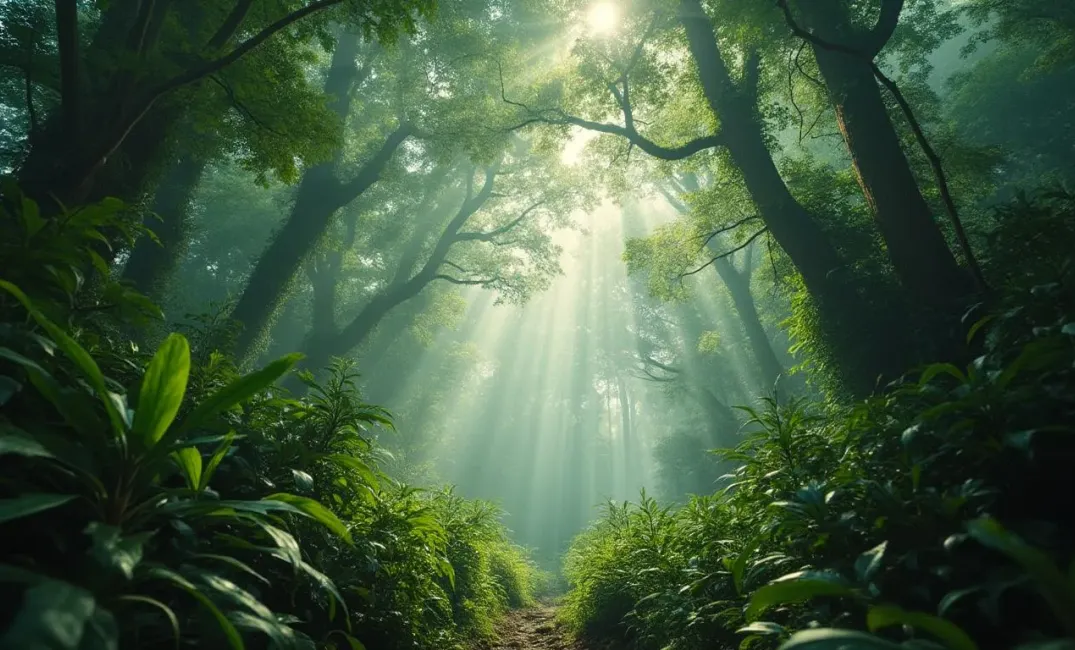Introduction: The Web of Life
"The clearest way into the Universe is through a forest wilderness." — John Muir
Humanity's relationship with the natural world is deeply intertwined with its history, culture, and survival. This intricate connection, explored through the lens of ecology, highlights the interdependence between humans and the diverse ecosystems that sustain life on Earth. This entry delves into the legacy of human ecology, examining how interdependence and stewardship have shaped civilization and its role in pursuing sustainability, reflecting the intricate dance between humanity and nature.
Early Human Encounters with Nature
Primitive Societies and Nature's Rhythms
- Hunter-Gatherer Tribes: Early humans, reliant on natural resources, adapted to their surroundings, developing deep knowledge of flora, fauna, and seasonal changes. This intimate awareness shaped spiritual beliefs and survival strategies.
- Animism and Reverence: Many indigenous cultures viewed nature as a living entity, fostering philosophies where land, plants, animals, and humans were spiritually interconnected. This reverence fostered sustainable practices, recognizing humanity's role within the natural cycle.
Agricultural Revolutions and Environmental Impact
- The Dawn of Agriculture: Transitioning from nomadic lifestyles to settled agricultural societies fundamentally altered ecosystems. Innovations like irrigation and crop rotations increased food production but often led to deforestation and soil depletion.
- The Balance of Resources: Ancient civilizations like the Nile Valley and Mesopotamia developed socio-religious systems centered around environmental stewardship, reflecting their reliance on and responsibility for the fertility of their lands.
Ecological Awareness Through the Ages
Medieval and Renaissance Perspectives
- Monastic Land Stewardship: Monasteries in medieval Europe, seeing themselves as custodians of God's creation, practiced sustainable farming and forestry. Their landscapes became refuges for biodiversity and bastions of environmental management.
- Natural Philosophy: Renaissance scholars, such as Leonardo da Vinci and Galileo, laid the groundwork for modern ecological thinking, intertwining art, science, and nature's interconnected patterns.
The Enlightenment and Industrial Repercussions
- Scientific Exploration of Nature: The Enlightenment heralded systematic studies of ecology, with naturalists like Carl Linnaeus classifying biodiversity, highlighting the interdependence of species within ecosystems.
- Industrial Revolution's Shadow: While technological advances propelled society forward, they also strained natural resources, instigating pollution, habitat loss, and a disconnect between humans and the natural world.
Modern Ecology: Science Meets Stewardship
Emerging Environmental Movements
- Ecology as a Science: The 19th and 20th centuries saw ecology emerge as a distinct scientific discipline, with figures like Charles Darwin and Rachel Carson emphasizing evolutionary adaptation and environmental harm, respectively.
- Conservation Milestones: Global movements catalyzed crucial environmental laws and policies. UNESCO's biosphere reserves, Earth Day, and the establishment of national parks spotlighted global ecological priorities.
Sustainable Development Paradigms
- World Summits and Agreements: Landmark events like the 1992 Earth Summit and the Paris Agreement worked towards aligning international efforts to address climate change, biodiversity loss, and sustainable development.
- Ecological Economics: Growing recognition of nature's intrinsic value prompted integrating ecological health into economic systems, promoting concepts like the circular economy, renewable energy, and sustainable agriculture.
Contemporary Ecological Challenges and Innovations
Climate Change and Global Interdependence
- Rising Temperatures and Sea Levels: Global warming intensifies weather patterns, threatens biodiversity, and impacts food security. These changes demand urgent adaptation and mitigation efforts.
- Collaborative Conservation: The realization that ecological challenges transcend borders encourages international partnerships focusing on conservation, education, and green technology.
Resilience and Innovation
- Nature-Based Solutions: Biophilic design, rewilding, and permaculture exemplify how aligning human development with natural systems can enhance resilience and restore ecosystems.
- Technological Pioneering: Innovations in biotechnology, renewable energy, and climate modeling offer promising pathways for reducing humanity's ecological footprint and fostering sustainable futures.
The Future of Human Ecology: Harmonizing with Nature
Systems Thinking and Interconnected Futures
- Integrative Approaches: Embracing systems thinking in science, policy, and education fosters holistic perspectives, inviting diverse communities to collaborate on sustainable solutions.
- Regenerative Cultures: Future success hinges on nurturing cultures that prioritize ecosystem health and human well-being, advocating for ethical stewardship and balanced resource use across generations.
Challenges and Opportunities
- Awakening Ecological Consciousness: Encouraging widespread ecological literacy can inspire innovative approaches, catalyzing grassroots movements and fostering environmental empathy.
- Aligning Economic and Environmental Goals: Ensuring green technologies and practices become economically viable remains pivotal in balancing progress with planetary stewardship.
Conclusion: The Journey Towards Ecological Harmony
"In wilderness is the preservation of the world." — Henry David Thoreau
The legacy of human ecology reflects the constant negotiation between advancement and sustainability. By recognizing humanity's role within Earth's web of life, we can pursue a harmonious coexistence with nature, honoring its wisdom and beauty.
As humanity embarks on unprecedented cosmic journeys, ecological principles offer vital guidance. May the lessons drawn from Earth's biosphere inspire future societies to weave sustainable narratives, fostering practices that protect and celebrate the planet's diverse life forms. In seeking balance, we nurture the hope that future generations continue this legacy of interconnection—a testament to the enduring spirit of Earth's custodians.
HUMAN ECOLOGY, INTERDEPENDENCE, ECOLOGICAL AWARENESS, ENVIRONMENTAL HISTORY, SUSTAINABLE DEVELOPMENT, SUSTAINABILITY, STEWARDSHIP, ECOSYSTEMS

